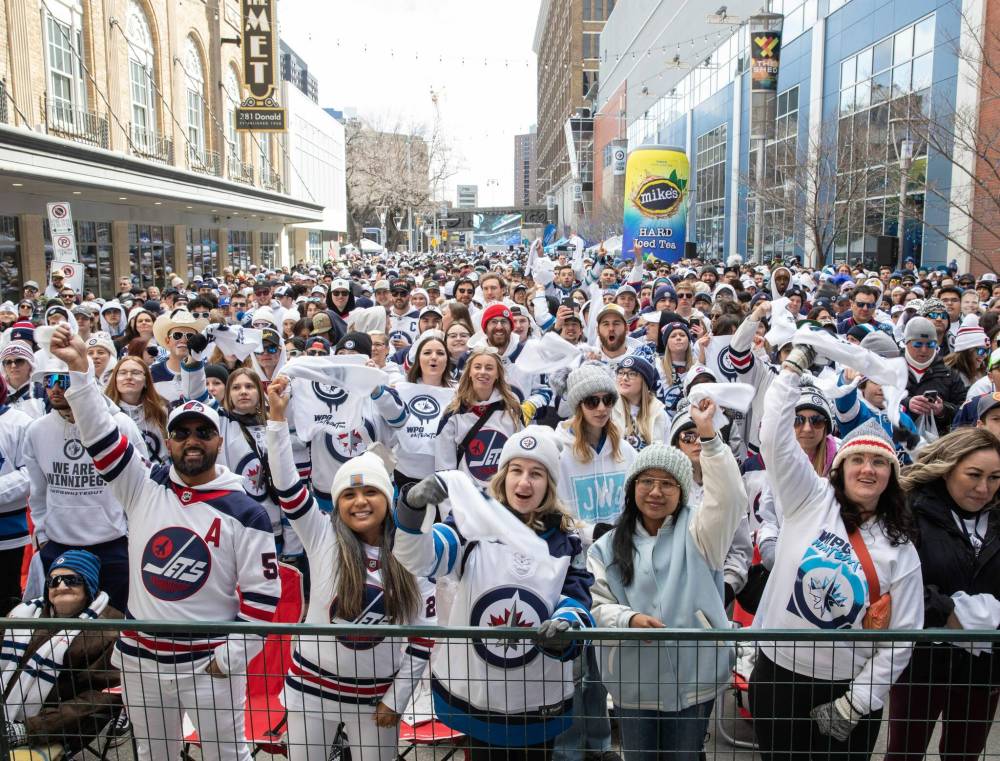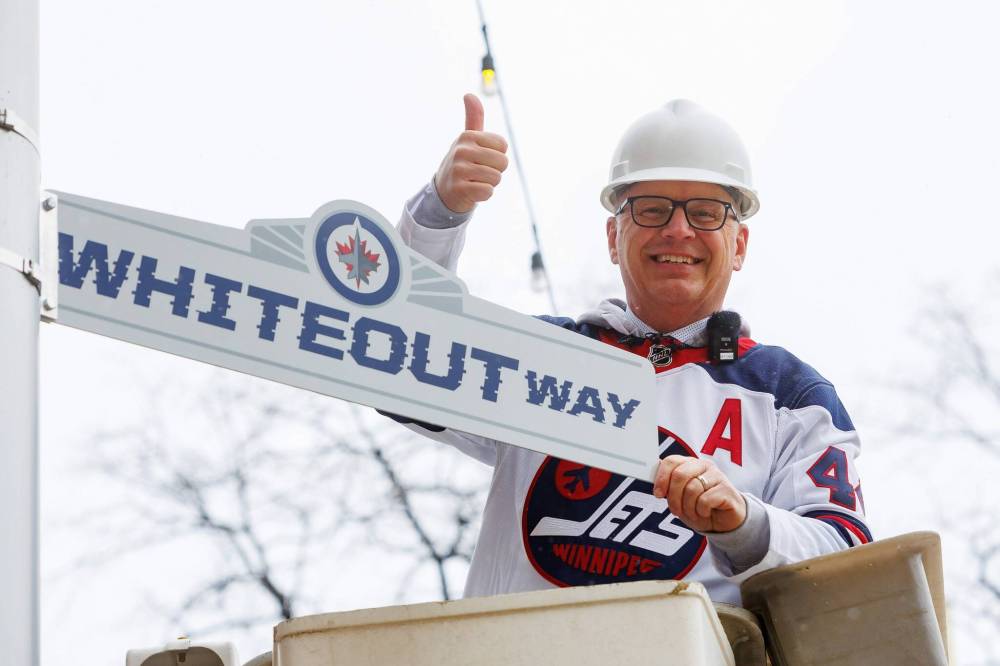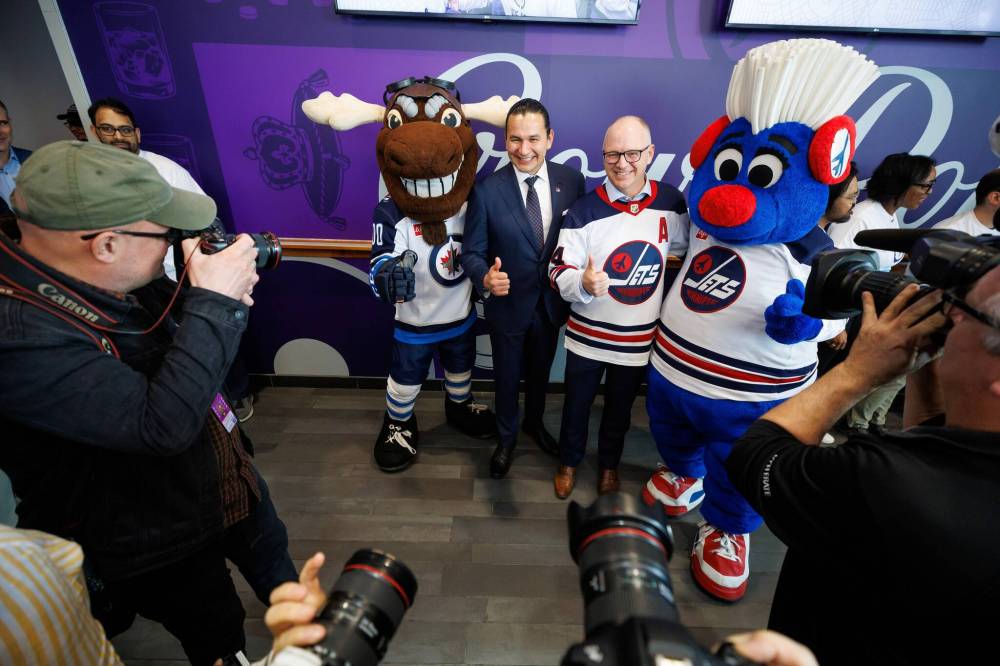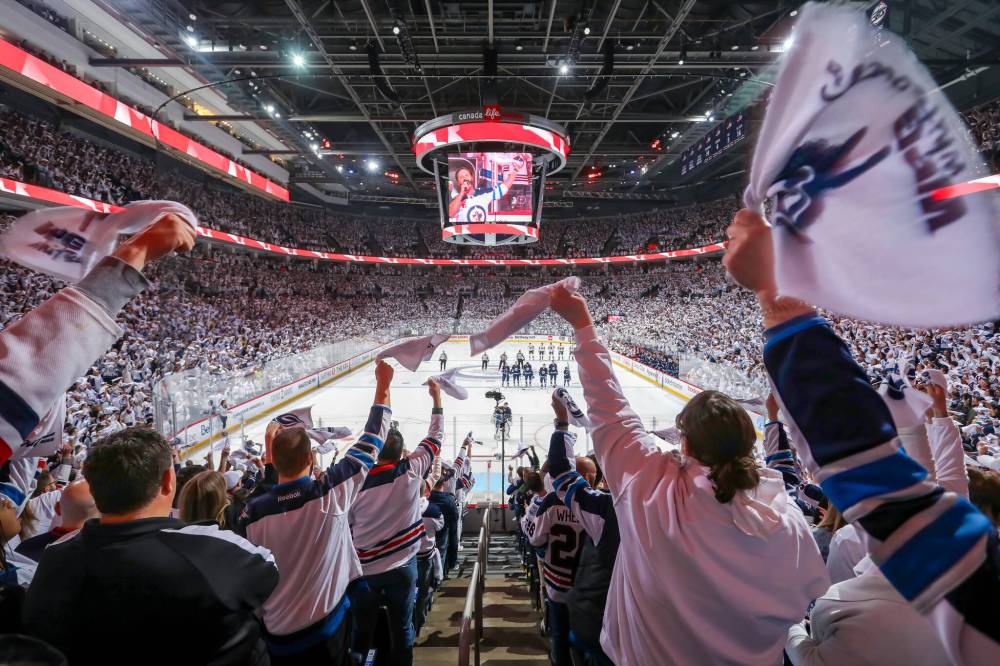Few predicted with certainty last fall the Winnipeg Jets would even qualify for the National Hockey League’s Stanley Cup playoffs.
Exceeding the expectations of most fans and so-called experts by finishing second in the Western Conference, they host the Central Division-rival Colorado Avalanche Sunday in the first game of what’s expected to be a tightly contested opening-round series.
But as the Jets were piling up victories during the 2023-24 campaign, the storyline switched from on-ice success to attendance woes.
Now, as the city braces for the full wallop of a Winnipeg Whiteout, the team’s participation in the post-season isn’t just an electric thrill-a-minute roller-coaster ride for fans, it’s a welcome injection of revenue for an ownership group that sounded alarm bells a couple of months ago.

JESSICA LEE / FREE PRESS FILE Thousands of Winnipeg Jets fans gathered downtown beside Canada Life Centre April 22, 2023 to watch the Jets play against the Golden Nights at a Whiteout party.
On the ice, the Jets enjoyed one of their best regular seasons since relocating from Atlanta in 2011, posting a 52-24-6 record to clinch second spot in the Central and home-ice advantage in Round 1. And, perhaps, beyond.
How far will that go in easing ownership’s financial concerns?
“Profitable? Yes, but it’s not the magic wand and we’re looking to play the long game,” True North Sports and Entertainment chief financial officer John Olfert told the Free Press.
“Without getting into specifics — and what the public needs to be mindful of — is we don’t budget for the playoffs. It’s a windfall, but it’s not a massive windfall, acknowledging that more than half the gate goes to the league.”
When Jets co-owner and True North executive chairman Mark Chipman said in February the team’s declining attendance “isn’t going to work over the long haul,” it made headlines across the country. Even NHL commissioner Gary Bettman came to town on Feb. 27 to assure fans the sky is not falling.
Chipman softened his stance days later, reminding the faithful the agonizing 1996 departure of Jets 1.0 was exactly why he started his journey to bring the NHL back to Winnipeg.
Flying high
On the ice, the Winnipeg Jets 2023-24 season has arguably been the team’s best, since or before relocation from Atlanta, despite finishing four points shy of the 2017-2018 season. Some numbers:
On the ice, the Winnipeg Jets 2023-24 season has arguably been the team’s best, since or before relocation from Atlanta, despite finishing four points shy of the 2017-2018 season. Some numbers:
- Wins: 52, ties franchise record
- Record: 52 wins, 24 losses, six overtime losses, good for fourth out of 32 teams, second in the Western Conference and first among the seven Canadian teams
- Regulation wins: 46, best in the NHL
- Goals against: 199, fewest in the NHL, earning the William Jennings Trophy
- Goal differential (difference between goals scored and allowed): 60, fourth-best in league
- Home record: 27 wins, 11 losses, three overtime losses, tied for third-best
- Away record: 25 wins, 13 losses, three overtime losses, tied for third-best
He told the Free Press that he wasn’t threatening to sell the team. But he wanted to make it known the Jets couldn’t continue spending to the NHL salary cap without more season-ticket revenue.
There were no sellouts at 15,225-seat Canada Life Centre through the Jets first 18 dates on 2023-2024’s 41-home game schedule. But it was a better finish; the building was full 10 times in the last 23.
If the playoffs mean anything to the club, it’s that nothing breeds success like success. Olfert says teams around the league aspire to season-ticket renewal rates of 90 per cent. The Jets are already past that line.
The team charged into the playoffs this season — beating the Pacific Division-champion Vancouver Canucks Thursday to cap off an eight-game win streak — as opposed to last year, when it limped to the finish, hanging on by a thread to a wild-card spot.
The benefits are showing.

MIKE DEAL / FREE PRESS
Winnipeg Mayor Scott Gillingham installs a celebratory “Whiteout Way” street sign at Donald Street and Graham Avenue Friday.
“Certainly, team performance has been a fantastic circumstance for us,” Olfert said. “The team is winning and is gearing up towards the playoffs. That certainly helps.
“What’s fascinating is that as we’ve entered the world of post-event surveys… and as much effort as we’ve put into guest experience, the greatest driver of post-event surveys is winning and losing. People feel better after they win.”
Olfert says he’s confident the team will return to its desired base of 13,000 season tickets — achieved in the blink of an eye in 2011 after the relocation of the Thrashers was announced — though, perhaps, not by next year.
Driving that, he expects, will be the benefits for post-season play that season-ticket members enjoy.
“As people are realizing right now, the demand for playoff tickets is high,” he says. “If you want to guarantee yourself playoff tickets at value prices, become a season-ticket member and there’s great value.”
The team is privately held, and does not release details about its finances. While Forbes speculated team revenues, inclusive of ticket sales, concessions, merchandise and sponsorship revenue, at US$161 million in the 2022-23 season, nobody but Chipman and his inner circle knows for certain.
Still, some educated guesses about the finances of playoff hockey are possible.
“If the Jets make a deep run, they could be looking at $6 million a game,” says Dan Mason, professor of sport management at the University of Alberta. “That increases the pressure on teams to make the playoffs, and why you see teams mortgaging their futures at the trade deadline to make it over that hump.”

MIKE DEAL / FREE PRESS
Mascots Mick E. Moose (left) and Benny (right) with Premier Wab Kinew and Mayor Scott Gillingham during the announcement at Canada Life Centre Wednesday.
Consider: a rough calculation of a sold-out Winnipeg regular-season home game brings in almost $1.5 million in ticket revenue (average ticket price of $95 times capacity). The $61.5 million that generates over the 41 home games of an 82-game season doesn’t come close to matching the salary cap of US$87.7 million, which translates to $110 million in Canadian funds. (Jets player salaries for this season are within US$400,000 of that cap, including a hit of US$2.75 million paid to buy out the final season of former captain Blake Wheeler’s contract.)
The expenses don’t stop there, however: there’s a substantial amount of non-player staff salaries, league royalties, operating expenses, travel costs — the team typically flies charters arranged by Air Canada Jetz — advertising, taxes and debt servicing, among others.
A very conservative estimate of concession revenues suggests the team earns at least an extra $304,500 per game, which assumes an average spend of $20 per patron. Considering $20 won’t cover the price of a beer and a Jets dog, it’s likely the average is higher.
Comparing the differences in ticket prices between regular-season and playoff games shows why making it to the show is so important.
The $80 a fan paid for a Section 329 seat for Tuesday’s game against the Seattle Kraken jumps to $257 for a comparable seat in Game 1 of the first round of playoff action. The $219 a fan in Section 117 paid becomes $487 in Game 1.
All of which, considering the discounts offered to season-ticket and share-package holders, points to the average ticket price jumping by between 200 and 300 per cent, meaning the gate for one game in Round 1 could be worth between $3 million and $4.5 million.
Even after giving more than half to the league, playoffs represent revenues the team doesn’t include in budgeting.
The Jets, not wanting to jinx Round 1, have not announced pricing for Round 2, but in previous seasons, each subsequent round has become increasingly pricey.

Jonathan Kozub file photo
As the city braces for the full wallop of a Winnipeg Whiteout, the Jets enjoyed one of their best regular seasons since relocating from Atlanta in 2011, posting a 52-24-6 record to clinch second spot in the Central and home-ice advantage in Round 1.
It also creates an incentive to earn home-ice advantage, as the Jets have this season, hosting Colorado for Games 1 and 2 and, with most pundits predicting a protracted best-of-seven series, Games 5 and 7 would also be played in downtown Winnipeg. A team without home-ice advantage could host three games — the third, fourth and sixth.
A seven-game series could boost True North’s coffers by as much as $18 million ($11.7 million after league revenue-sharing contributions), not including concessions and merchandise. For a team that might average $60 million over the 41 home games of a regular season, an extra $11.7 million goes a long way to paying for US$87.7 million in player salaries, based on the 2024 salary cap.
None of these figures include concessions, merchandise or sponsorship, which typically spike during playoffs, Mason says.
“People get swept up in the excitement, so concessions are up…. It’s sort of a perfect storm, which is why teams are so desperate to make it into the playoffs,” he says.
Olfert says merchandise sales spiked as soon as the Jets clinched a playoff berth on April 4 with a 5-2 win over the Calgary Flames. He’s expecting concession revenue, particularly with the added Whiteout street parties, to follow suit.
The playoffs also provide a showcase to folks swept up in the hoopla who might be converted into more than just casual fans.
“There’s just natural excitement,” he says. “Everybody is wearing white. You drive down the street and you see posters in the windows. It catches on at schools and kids are watching. They’re asking their parents (about the Jets).”
The playoffs are a financial windfall for the 16 participating teams, but the 16 that fall short also benefit, though to a lesser extent. According the NHL and NHL Players’ Association collective agreement, 35 per cent of playoff teams’ gate revenue is collected by the league.
The Player Compensation Cost Redistribution System is a fancy title for what is essentially revenue sharing. During the regular season, teams in the Top 10 in revenues contribute to a fund distributed to teams in the Bottom 15, roughly speaking.
That all changes in the playoffs, however, as each team that qualifies contributes 35 per cent of its ticket revenue to the redistribution fund. The playoff contribution can’t exceed 50 per cent of that fund, so any amount more than half is refunded to the playoff teams.
For the Jets, it’s not just the march to the post-season dance driving ticket sales. While fans were on tenterhooks last summer wondering if top centre Mark Scheifele or star goaltender Connor Hellebuyck would stay with the team or move on — triggering what would likely be a painful rebuilding period — the unexpected Thanksgiving Day signing of both reverberated around the league, and among fans.
“There’s an expectation of winning. We’ve taken the word ‘rebuilding’ out of our vernacular. We are retooling and we always want to keep on competing. We think we owe that to our fan base,” says Olfert. “That’s just intrinsically motivated. We want to win. Our task on the business side, as a broader community, is to operate this asset such that we generate earnings that we spend to the cap.
“Echoing Mark (Chipman) and (general manager Kevin Cheveldayoff’s) comments, the players’ commitments reflects well on the city. We’ve talked about being a source of pride and it’s not just for the Winnipeg Jets, it’s Winnipeggers feeling good about themselves.”
kelly.taylor@freepress.mb.ca
ken.wiebe@freepress.mb.ca

Kelly Taylor
Copy Editor, Autos Reporter
Kelly Taylor is a Winnipeg Free Press copy editor and award-winning automotive journalist; he also writes the Business Weekly newsletter.

Ken Wiebe
Sports reporter
Raised in the booming metropolis of Altona, Man., Ken Wiebe grew up wanting to play in the NHL, but after realizing his hands were more adept at typing than scoring, he shifted his attention to cover his favourite sport as a writer.